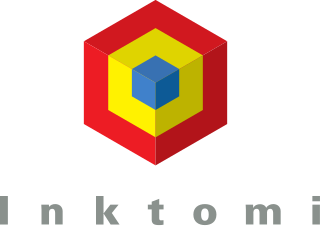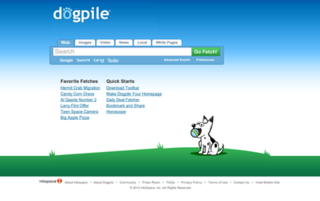
Internet Explorer is a retired series of graphical web browsers developed by Microsoft that were used in the Windows line of operating systems. While IE has been discontinued on most Windows editions, it remains supported on certain editions of Windows, such as Windows 10 LTSB/LTSC. Starting in 1995, it was first released as part of the add-on package Plus! for Windows 95 that year. Later versions were available as free downloads or in-service packs and included in the original equipment manufacturer (OEM) service releases of Windows 95 and later versions of Windows. Microsoft spent over US$100 million per year on Internet Explorer in the late 1990s, with over 1,000 people involved in the project by 1999. New feature development for the browser was discontinued in 2016 and ended support on June 15, 2022 for Windows 10 Semi-Annual Channel (SAC), in favor of its successor, Microsoft Edge.

Lycos, Inc., is a web search engine and web portal established in 1994, spun out of Carnegie Mellon University. Lycos also encompasses a network of email, web hosting, social networking, and entertainment websites. The company is based in Waltham, Massachusetts, and is a subsidiary of Ybrant Digital.

Inktomi Corporation was an American Internet service provider (ISP) software developer based in Foster City, California. Customers included Microsoft, HotBot, Amazon.com, eBay, and Walmart.

Alexa Internet, Inc. was an American web traffic analysis company based in San Francisco. It was a wholly-owned subsidiary of Amazon.

AltaVista was a web search engine established in 1995. It became one of the most-used early search engines, but lost ground to Google and was purchased by Yahoo! in 2003, which retained the brand, but based all AltaVista searches on its own search engine. On July 8, 2013, the service was shut down by Yahoo!, and since then the domain has redirected to Yahoo!'s own search site.

Dogpile is a metasearch engine for information on the World Wide Web that fetches results from Google, Yahoo!, Yandex, Bing, and other popular search engines, including those from audio and video content providers such as Yahoo!.

A metasearch engine is an online information retrieval tool that uses the data of a web search engine to produce its own results. Metasearch engines take input from a user and immediately query search engines for results. Sufficient data is gathered, ranked, and presented to the users.
Yahoo! Search is a search engine owned and operated by Yahoo!, using Microsoft Bing to power results.

Hotwired (1994–1999) was the first commercial online magazine, launched on October 27, 1994. Although it was part of the print magazine Wired, Hotwired carried original content.
Browser hijacking is a form of unwanted software that modifies a web browser's settings without a user's permission, to inject unwanted advertising into the user's browser. A browser hijacker may replace the existing home page, error page, or search engine with its own. These are generally used to force hits to a particular website, increasing its advertising revenue.

FrostWire is a free and open-source BitTorrent client first released in September 2004, as a fork of LimeWire. It was initially very similar to LimeWire in appearance and functionality, but over time developers added more features, including support for the BitTorrent protocol. In version 5, support for the Gnutella network was dropped entirely, and FrostWire became a BitTorrent-only client.

A search engine is a software system that provides hyperlinks to web pages and other relevant information on the Web in response to a user's query. The user inputs a query within a web browser or a mobile app, and the search results are often a list of hyperlinks, accompanied by textual summaries and images. Users also have the option of limiting the search to a specific type of results, such as images, videos, or news.
Windows Live Toolbar was a browser extension toolbar for Internet Explorer. It superseded MSN Search Toolbar. Windows Live Toolbar provided a simple search interface that starts to list results as the user types in a search query and uses Bing as its search engine. The toolbar also allows users to synchronize their Internet Explorer favorites across multiple computers and provides an interface to Windows Live and MSN services.

This article details features of the Opera web browser.
Scour Inc. was a multimedia Internet search engine, and provided Scour Exchange, an early peer-to-peer file exchange service.

Opera is a multi-platform web browser developed by its namesake company Opera. The current edition of the browser is based on Chromium. Opera is available on Windows, macOS, Linux, Android, and iOS. Two mobile versions are still active, called Opera Mobile and Opera Mini. Opera also has a news aggregator app called Opera News with an AI search-engine.

DuckDuckGo is an American software company that offers a number of products intended to help people protect their online privacy. The flagship product is a search engine that has been praised by privacy advocates. Subsequent products include extensions for all major web browsers and a custom DuckDuckGo web browser.
Internet censorship circumvention, also referred to as going over the wall or scientific browsing in China, is the use of various methods and tools to bypass internet censorship.

Brave is a free and open-source web browser developed by Brave Software, Inc. based on the Chromium web browser. Brave is a privacy-focused browser, which automatically blocks most advertisements and website trackers in its default settings. Users can turn on optional ads that reward them for their attention in the form of Basic Attention Tokens (BAT), which can be used as a cryptocurrency or to make donations to registered websites and content creators.

Cliqz was a privacy-oriented web browser and search engine developed by Cliqz GmbH and majority-owned by Hubert Burda Media. It was available as a desktop and mobile web browser as well as an extension for Firefox itself.














